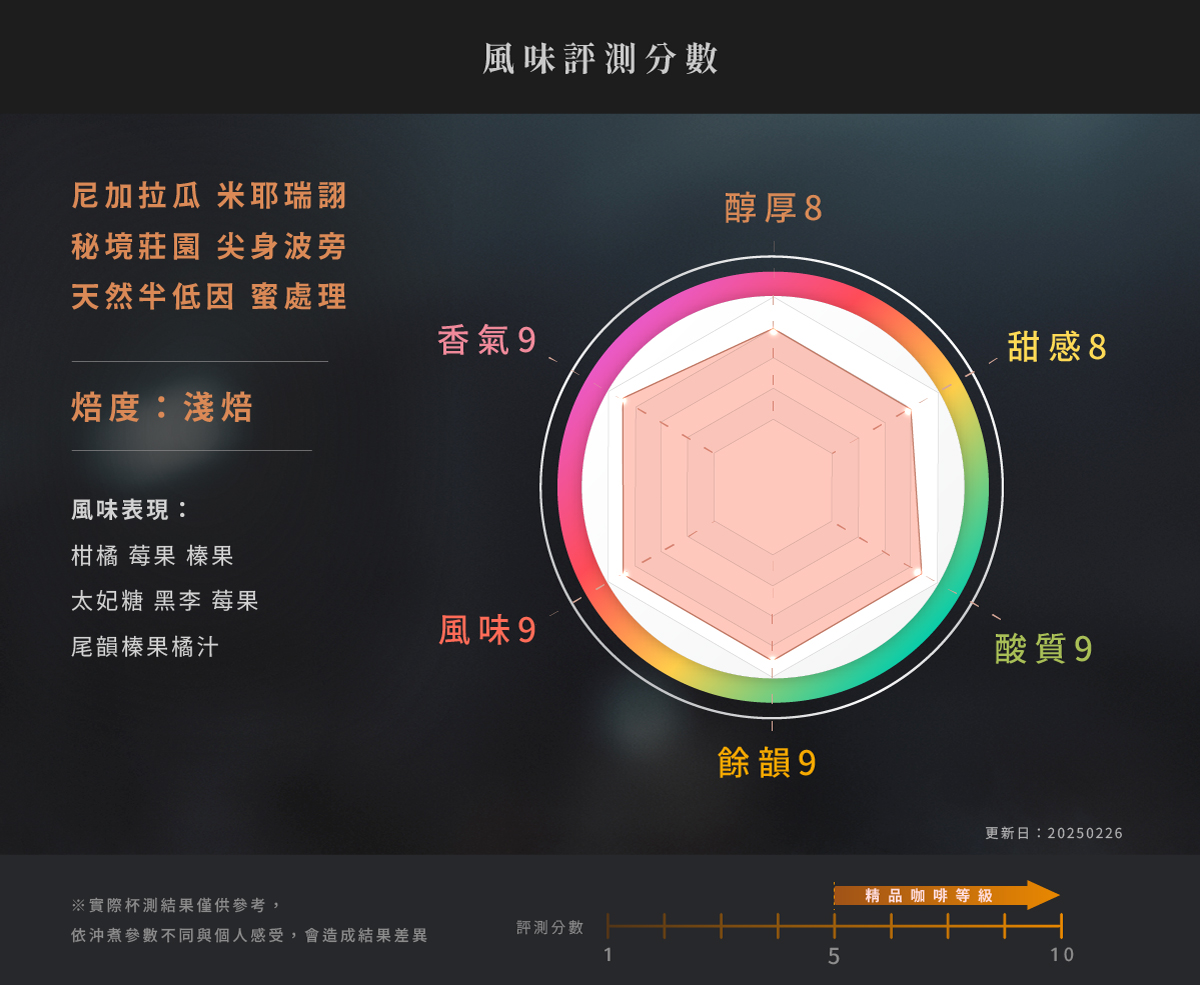

Nicaragua Fincas Mierisch Limoncillo, the coffee bean options are as follows:
Nicaragua Fincas Mierisch Matagalpa El Suspiro Orange Bourbon Washed
Nicaragua Fincas Mierisch Limoncillo Washed
------------------
Nicaragua Fincas Mierisch Limoncillo Funky Natural

-----------------
Nicaragua Mierisch La Escondida Laurina Pulped Natural









Coffee Flavor
The flavors of coffee are derived from the breakdown of various nutrients in the green coffee beans during roasting. Heat causes these compounds to degrade into a variety of aromatic molecular structures, resulting in a wide spectrum of flavors. High-quality coffee beans naturally possess a rich aroma that evolves at different temperatures—high, medium, and low—offering a delightful and nuanced experience worth savoring.
Nicaragua Fincas Mierisch Matagalpa El Suspiro Orange Bourbon Washed
Milk chocolate, citrus, cocoa, nutty finish, toffee
Nicaragua Fincas Mierisch Limoncillo Washed
Honey, Nuts, Floral Notes Nutty and Minty Finish with a Round Acidity Delicate and Refined Body
Nicaragua Fincas Mierisch Limoncillo Funky Natural
Dried longan, Butter, Hami melon, Very clean with a round, rich body and a lingering Dried Longan finish.
Nicaragua Mierisch La Escondida Laurina Pulped Natural
Citrus, Berries, Hazelnut, Toffee, Black plum, Berries, with a hazelnut and orange juice finish.

The Mierisch family has been growing coffee since 1908, with over 100 years of history. In the past 15 years, the family's investment in coffee equipment, processing technology, and personnel training has led to significant growth in their micro-lot coffee beans. These changes are a result of the entire family's efforts and the tireless dedication of each member.
Thanks to the efforts of generations of the Mierisch family, they have a strong track record in the Cup of Excellence (COE) competition. Since 2008, they have been finalists in the COE six times. In 2017, they won fourth place in the Nicaragua COE, and in 2022, they won second place in the Honduras COE. Mierisch coffee can also often be seen at coffee exhibitions around the world. The family owns 14 estates, most of which are located in Nicaragua (San Jose, Limoncillo, Escondida, Milagros, Placeres, Los Altos, Mama Mina, Suspiro) and a few in Honduras (Cerro Azul).
❱ El Suspiro
El Suspiro is one of twelve estates owned by the Mierisch family, located in the Cerro Arenal Nature Reserve of Matagalpa, Nicaragua. Nestled among mist-covered valleys and rolling mountains, the estate is surrounded by pristine forests and natural springs. Nearby family-owned farms, including La Huella and Los Altos, together form a specialty coffee corridor that upholds both sustainability and tradition.
Founded in 2005 by Alejandro Saldaña and María Ligia Mierisch, El Suspiro Estate is best known for its Orange Bourbon variety, originally from El Salvador, while also cultivating Caturra, Red and Yellow Catuai, and Javanica.
❱ Finca Limonar/El Limoncillo
El Limoncillo is a UTZ-certified estate with approximately 53 hectares of ecologically protected area. The UTZ certification covers every step of coffee production, from growing to roasting, requiring that every coffee bean be produced with a respectful attitude towards people and nature. Therefore, the El Limoncillo Estate provides training in better agricultural practices to increase yields and coffee bean quality, while improving worker conditions and achieving environmental protection, realizing the sustainable development of the coffee industry.
❱ Escondida Estate
Escondida is one of the more well-known estates among Mierisch's several farms in Nicaragua, which also include El Suspiro, Mama Mina, La Huella, and others. Each estate, due to its unique location and terrain, possesses distinct microclimates and soil compositions. Coupled with the Mierisch family's diverse and meticulously managed varieties, and their continuous efforts in post-processing innovation and improvement, this family's estate system showcases a remarkably comprehensive and rich range of variations. Not only are they frequent winners of the Nicaragua Cup of Excellence (COE), but in addition to their own annual international auction, Los Favoritos, the Mierisch estates have recently expanded their coffee cultivation into Honduras. In 2019, they won the Honduras COE with their St. Lucia Gesha/Geisha, further solidifying the Mierisch family's irreplaceable status among specialty coffee connoisseurs.

The coffee tree, botanically classified under the Rubiaceae family and the Coffea subgenus, is an evergreen tree. Coffee beans are the seeds of the coffee fruit. There are three main varieties: Arabica, Robusta, and Liberica. These three varieties cannot crossbreed to produce different subspecies. The world’s specialty coffee comes from the Arabica variety, and within Arabica, there are various subspecies resulting from evolution, hybridization, and mutation. The world's specialty coffees are derived from Arabica, which itself has various subspecies and hybrids resulting from evolution, crossbreeding, and mutations.
Catuai
Catuai, the Arabica coffee variety, is a hybrid of Caturra and Mundo novo. Caturra is short and Mundo Novo is tall. Later, the improved height is more convenient for harvesting. The taste is sweet, the sweetness performance is similar to that of Cattura, and the sourness is less, which improves the shortcomings of bad taste and poor flavor, and has a good sense of balance.
----
Arabica Variety – Orange Bourbon
The Orange Bourbon is a natural mutation of Red Bourbon from El Salvador. When farmers first observed the cherries ripening, the fruit, which would normally turn deep red, instead displayed a soft orange-peach hue under sunlight, astonishing everyone with its unique and striking beauty.
Yet behind this beauty lies a significant challenge for growers. Orange Bourbon is notoriously difficult to cultivate, requiring high-altitude conditions, mineral-rich volcanic soil, and a temperate, stable climate. It also demands meticulous and precise management to protect against leaf rust and pests. Due to its exacting nature, yields remain limited, and only experienced and dedicated farmers who are willing to invest long-term can successfully cultivate it.
The Orange Bourbon from El Suspiro Estate is considered a rare gem in Central America’s coffee treasure trove, offering in return a complex and multi-layered flavor profile.
----
Arabica Coffee Variety: Bourbon Pointu (Laurina/Bourbon Pointu)
Bourbon Pointu is renowned for its unique flavor profile and rich, romantic history, making it an exceptionally valuable coffee variety. One of its most distinctive characteristics is its naturally low caffeine content. While most Arabica coffee varieties contain around 1.2% caffeine, Bourbon Pointu has only about 0.45% to 0.7%, making it a rare, naturally low-caffeine coffee.
The history of Bourbon Pointu dates back to the 18th century on Île Bourbon, now known as Réunion Island, a French overseas territory located between Madagascar and Mauritius. This coffee was named after its place of origin, while “Pointu” refers to the coffee bean’s unique elongated shape with pointed ends. Additionally, it is also known as "Laurina," reportedly due to its tree shape resembling the laurel tree (Laurel).
A Lost Treasure Returns to the Specialty Coffee Market
By the 19th century, Bourbon Pointu had nearly disappeared from the market. The primary reason was the economic shift toward sugarcane cultivation, which was more profitable at the time, leading many coffee farmers to switch crops. Moreover, due to its lower caffeine content, Bourbon Pointu had weaker natural resistance to pests and diseases. Combined with its low yield, farmers opted for more productive coffee varieties instead.
However, in 2002, a surviving Bourbon Pointu tree was discovered on a farm in Costa Rica, sparking efforts by experts to revive and reintroduce it to the market. Despite these efforts, Bourbon Pointu remains an extremely rare variety, with limited seed availability and only a handful of farms cultivating it worldwide. As a result, it continues to be one of the most exclusive and highly prized coffee varieties on the market.

(Coffee Processes)
The term "processing methods" refers to the process of transforming ripe red coffee cherries into dried green beans. Each method has its advantages and disadvantages, influenced by the natural environment and the specific needs of the coffee-producing region. As a result, different regions adopt the processing method most suited to their conditions. This batch uses Funky Natural processing and washed methods, described below:
【Washed Process】
Also known as the wet process, this method involves removing the skin and pulp of the coffee cherries before drying. The seeds are then fermented in water tanks to eliminate the remaining mucilage on their surface, followed by thorough washing and drying under sunlight or with mechanical dryers.
The washed process produces a cleaner and crisper flavor profile compared to the natural process. Coffees processed this way typically have lighter body, brighter acidity, and distinct fruit flavors. This method is often associated with specialty coffee due to its clarity and vibrant flavor expression.
【Deep Fermentation Natural – "Funky Natural"】
The name “Funky” in Lemon Tree Estate’s deep fermentation natural process comes from its unique processing method, which creates a distinctive and flavorful taste profile. This process involves a controlled fermentation stage. Coffee cherries are harvested at their peak ripeness (deep red) and transported to the processing station, where they are spread in thick layers on plastic tarps—unlike the traditional natural process, which typically uses thinner layers.
During the drying phase, the cherries are turned less frequently (normally, natural processing requires turning 3-4 times per day). The thicker layering and lower turning frequency allow the cherries to undergo a controlled fermentation process for approximately 24-36 hours. Throughout this period, the cherries and mucilage are continuously monitored and tasted to prevent over-fermentation.
After fermentation, the cherries are spread out in a thin layer and turned frequently. They are sun-dried for 8 days before being transferred to African-style raised beds for an additional 28-30 days until the moisture content reaches 12%.
----------
【 Pulped Natural / Semi-dry Process】
The honey process is a method that combines elements of both the natural process and the washed process. This technique was initially developed in Costa Rica. Similar to the washed process, the skin and pulp of the coffee cherries are removed, but the fermentation step is skipped. Instead, the mucilage layer (a sticky, sugary layer around the bean) is left intact and dried under sunlight.
The term "honey" does not refer to the addition of actual honey. Rather, it derives from the sticky texture of the mucilage, which resembles honey. The retention of this layer, rich in sugars and acids, is the key to the honey process. The amount of mucilage left on the beans determines the sweetness and flavor complexity.
The flavor profile produced by the honey processing method lies between that of the natural (sun-dried) and washed processes, resulting in a very unique cup of coffee. The taste is cleaner than the natural process, and due to the residual mucilage, it also has a richer syrupy sweetness. The acidity is more pronounced than in washed coffees, but the body is richer and more full-bodied than that of washed coffees.





JUSTIN INTERNATIONAL FOOD ENTERPRISE CO., LTD.
Tel: +886-3-358-6611
1st Floor, No. 30, Lane 120, Daxing Road, Taoyuan District, Taoyuan City
▶This product is covered by a NT$10 million product liability insurance.
▶Food Industry Registration Number: F-165601955-00000-0
▶ Our company’s cupper is certified as a CQI International Coffee Quality Appraiser.



Recommended Products


※ For detailed shipping and payment information, invoices, overseas ordering instructions, etc., please click here to enter.
